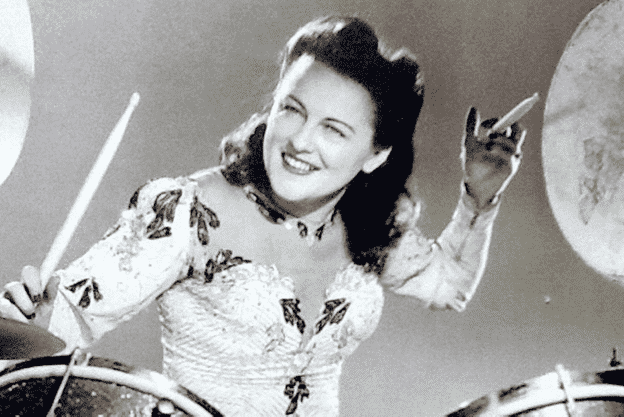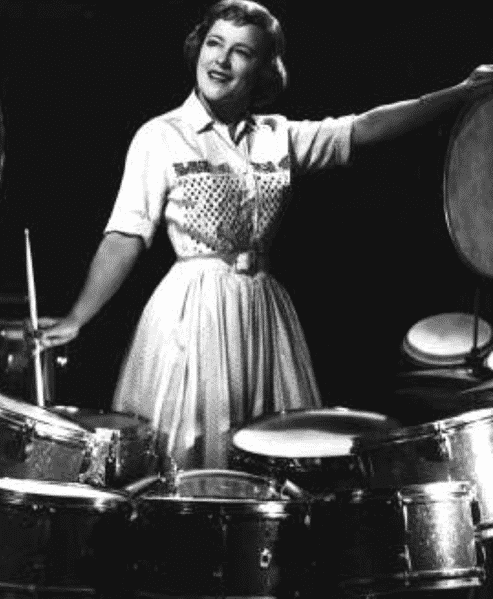Pioneering Drummer Viola Smith Passes


Drummer Viola Smith, one of the first female drummers of note, has passed away. She was an astounding 107 years old. Modern Drummer profiled Smith in the April 2003 issue; we’re sharing that piece in honor of her remarkable career.
It’s well known that during the Second World War, when America’s young men were away in the armed services, their places in industry were taken by women. The image of “Rosie the Riveter” is a cherished icon in American history. But what isn’t as well known is that when the ranks of the country’s popular all-male big bands were reduced by the call to arms, women stepped in to fill that gap, too.
The females of the WWII-era “all-girl” bands were highly accomplished musicians. They were the “Swing Shift Maesies” who rivaled their male counterparts with talent that had previously been cloaked under a veil of “glamour.” As such they helped serve as agents for social, racial, and gender-role change that began during the war years. Advertisement
During the early days of World War II, a heart-heavy nation craved social release, escape, and interpersonal contact—which could be provided by music and dancing. At the same time, America was witnessing a period of unparalleled dichotomies: opportunities and obstacles, restrictions and mobility, unity and separation. Amid the waves of patriotism, perceptions of gender difference were primed to splinter and eventually shatter. Female musicians were poised and ready for the changes. And one veteran drummer with seventeen years of experience set the pace.
Viola Smith was endowed with incredible skill, musical genius, and a fiery soul, and she employed them all to gain unprecedented fame and drawing power during the war years. In 1942 Viola declared to the American music community that “hep” female drummers might just be here to stay. Mere weeks after the attack on Pearl Harbor, she was quoted in Down Beat magazine as saying, “In these times of national emergency, many of the star instrumentalists of the big-name bands are being drafted. Instead of replacing them with what may be mediocre talent, why not let some of the great girl musicians of the country take their places?” It was the rimshot heard round the world, challenging perceptions about the true ability of women musicians that were evident in public comments like, “You play good…for a girl.”
Viola began drumming with a family-based orchestra in Mt. Calvary, Wisconsin in the 1920s. Summers were spent touring with professional dance orchestras. Beginning in 1925, the Smith Sisters (originally the Schmitz Sisters) toured the famed RKO circuit. Viola also traveled with Jack Fine’s Chicago Band Box Review on the Keith-Orpheum circuit. They shared the bill with a little-known singing trio called the Andrews Sisters, who would get their big break in 1937. Advertisement
By 1934 Viola was anchoring an eighteen-piece, all-women big band on Major Bowes’ Original Amateur Hour, which debuted on New York radio and was ultimately broadcast on CBS radio. The band would back the amateur entertainers who were offered a shot at fame and fortune on the show. By 1940 Viola had gained enough personal notoriety to be featured on the February 24 issue of Billboard magazine, along with her drumset. Around that time she and her sister Mildred organized a highly successful and acclaimed band called the Coquettes. The band fared exceptionally well, and was frequently hailed as the only rival to Phil Spitalny’s hugely popular Hour of Charm all-girl orchestra. (Viola attributes much of her own personal success in music and life to the contributions of her talented sister.)
The Coquettes disbanded in 1941, and in the spring of 1942 Viola accepted Phil Spitalny’s invitation to join his famous orchestra. The promotional emphasis was on both glamorous style and keen musical substance. The Spitalny-specific style emphasized a semi-classical repertoire with member compositions reflective of the “ladylike, non-threatening” musicians. It brought the band great success. So much success, in fact, that it was one of the very few all-girl orchestras to record and appear in films. Viola was in several of those films, including Here Come the Co-Eds, with Abbott & Costello. Smith was intrigued by the world of film sets and high-profile celebrities. Still, she reveals with a chuckle that she had no trouble turning down Frank Sinatra’s request for a date—not once, but twice!
Viola was a constant student of the drums. She spent much of her free time studying with famous music teachers, such as Saul Goodman of New York’s Juilliard School, with whom she studied timpani. Karl Glassman of the NBC Symphony Orchestra and renowned swing drummer Cozy Cole were also mentors for Viola. As part of her “studies,” she honed her dance-band skills to create special showstopping numbers. These included an eight-piece drum rendition of “Mary Had a Little Lamb” that she describes as “a wildly popular crowd pleaser with stick tossing and spin action for added punch.” Advertisement
Viola remained with the Hour of Charm orchestra for more than thirteen years, until the group disbanded in 1954. She continued her drumming career, at first working as a single act, Viola & Her Seventeen Drums. Later, from 1966 to 1970, she appeared in the Broadway production of Cabaret, playing drums in the Kit Kat Klub’s all-girl band. Along the way, she cites two specific performances that she would delight in reliving. One was an evening at the Paramount Theater in the 1950s, which she describes as “a gala event, with the Andrews Sisters and innumerable celebrities present.” The second was Harry Truman’s presidential inauguration in 1945—the first openly integrated inaugural celebration.
Today Viola divides her time between New York City and Fon du Lac, Wisconsin. She isn’t playing much these days, but her far-reaching inspiration and influence is apparent in the likes of Diva big band leader/drummer Sherrie Maricle, along with written tributes such as Swing Shift, by Sherrie Tucker. Once described as “a female version of Gene Krupa,” Viola scorched the stereotypes of “girl drummer” and forged an indelible mark on the drumming community.
Story by Beverly Collins
Portions reprinted with permission from Not So Modern Drummer.


